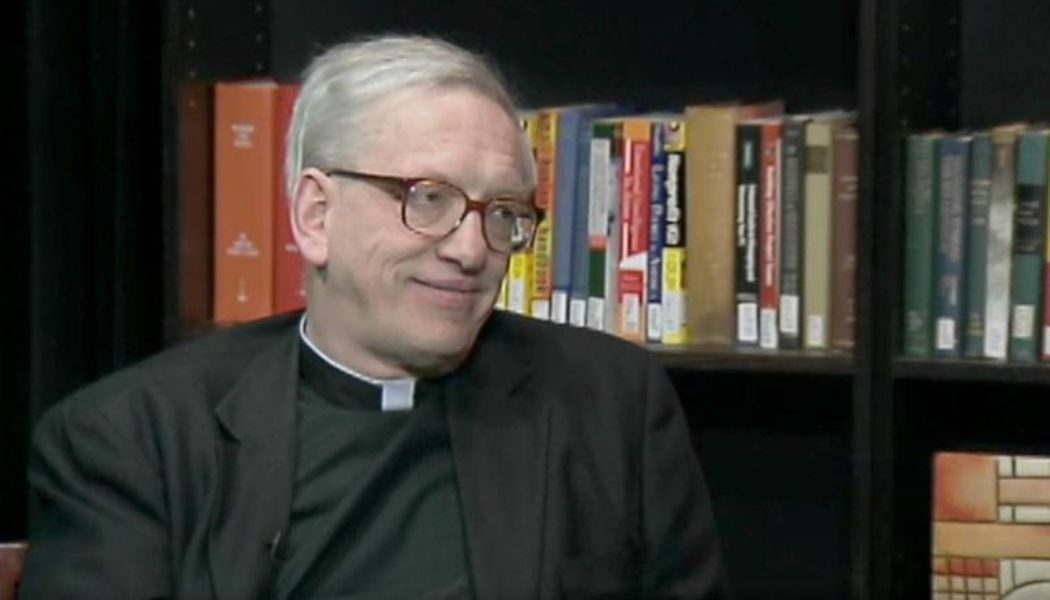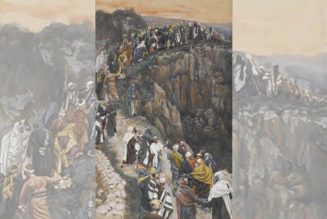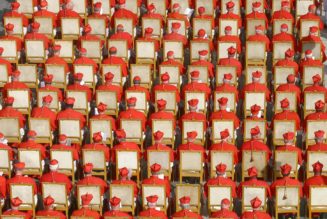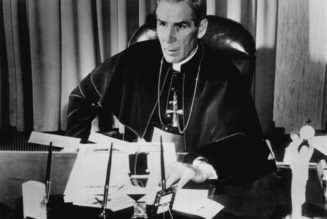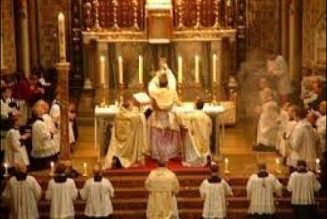
My friend Father Joseph Koterski died suddenly last week. The Jesuit priest’s funeral was held Tuesday at the university church at Fordham University, where he taught philosophy for 30 years, lived in the student residences and carried on a peripatetic ministry throughout New York’s communities of women religious.
Never has a man in perpetual motion seemed so serene.
“Koterski never sleeps,” the president of Fordham, Jesuit Father Joseph McShane, liked to say. It seemed the only explanation for how he could squeeze his sacramental ministry, spiritual direction and retreat preaching into an already-full life as a university professor — teaching, academic publishing and mentoring of students as a kind of don in residence at Fordham’s Rose Hill campus. He even took on his share of duty on that bane of every academic’s existence, the university senate.
Father Koterski found time for mission trips to Haiti, all the more poignant to recall this week, as another set of natural disasters has tormented that afflicted country.
The well-known Latin motto, fac omnia bene (“do all things well”) described his Jesuit life, well lived.
I recall one Sister of Life telling me that Father Koterski, when preaching retreats that they would host, would come — after celebrating Mass, hearing confessions, doing spiritual direction and preaching conferences — into the kitchen to help with the dishes.
“Well, of course he does,” I replied. “Father Koterski does everything.” He did everything well, even the dishes, with a cheerful generosity of spirit that made the sacrifices he made for others hard to notice.
“I have never met anyone so generous — in his thought, in his person, in giving of himself to anyone and everyone,” Mother Agnes Mary Donovan of the Sisters of Life told Kathryn Jean Lopez for America magazine.
In recent years, the most famous American Jesuit has been Father James Martin, chosen as a sort of flagship Jesuit by Pope Francis for his pontificate. Pope Francis would have done better to choose Father Koterski to exemplify what is best about the Society of Jesus, but Father Koterski did not seek the limelight.
In any case, Father Koterski was something of a model St. John Paul II priest. Ordained in 1992, in the early part of the greatest teaching decade in the history of the papacy, he seemed to bring to life the late Holy Father’s pastoral vision.
Consider the 1990 encyclical Redemptoris Missio (The Mission of the Redeemer), in which John Paul taught that every Catholic is to be a missionary and all territory was mission territory. Father Koterski found plenty of mission territory in New York — he covered more ground in his car than many do by plane. He knew that Jesuit universities — Fordham included — and the Society of Jesus were mission territory, too, in need of conversion. This he did more by witness than words, and the necessary reform of the Society has been set back by his untimely death at age 67.
Consider the 1992 apostolic exhortation, Pastores Dabo Vobis (I Will Give You Shepherds), on priestly formation. John Paul emphasized the importance of human formation for a priest, that his life of virtue and character were the raw materials of his ministry. An arrogant, lazy and crotchety priest will have limited pastoral impact. Father Koterski’s humility, hard work and kindness made his many other gifts available to a vast number.
Consider the 1995 encyclical Evangelium Vitae (The Gospel of Life). Father Koterski was a pro-life hero, serving the cause of life with both his heart and his mind. He was a key figure in the University Faculty for Life, serving long years in leadership roles.
Consider the 1996 apostolic exhortation Vita Consecrata (Consecrated Life), a new charter for the renewal of religious life, decimated by the turmoil of the 1970s and 1980s. Father Koterski spent so much time with the Sisters of Life and Missionaries of Charity that those religious women thought of him as part of their community. He taught classes for them on Christian philosophy, but his daily service in offering the Holy Mass, hearing confessions and spiritual direction took him to a variety of convents five or six days a week.
For the Sisters of Life, a new community that has yet to have any of their sisters die, Father Koterski’s death was for many sisters their first experience of a death in their religious family.
Consider the 1998 encyclical Fides et Ratio (Faith and Reason), John Paul’s vision of faith and reason as “two wings on which the human spirit rises to the contemplation of truth.” A brilliant philosopher, Father Koterski was a master of reason; a faithful Jesuit, he knew that the greater glory of God could only be glimpsed by faith. The compatibility of faith and reason in service of the truth about God and man was rarely so winsomely lived.
Drawing on his own life as an academic philosopher, John Paul proposed in Fides et Ratio that there should be a sort of friendship between teacher and student, that the search for truth should not be limited to the intellect alone, but was a task for the whole person. Companions on the path to truth should become companions in life. Countless students of Father Koterski — both those in his classes and those of us whom he taught in passing, as it were — experienced just that in the learned scholar who was willing to be a wise friend.
Finally, consider one of John Paul’s lesser, but lovely documents, the 1999 “Letter to Artists.” Father Koterski was no prisoner of the logician’s syllogism; he knew that certain parts of the human heart could be touched more by the playwright than the philosopher. So he would read Shakespeare with his students at Queen’s Court Residential College, or Dorothy Sayers with the Sisters of Life, attending to their cultural formation.
I first met Father Koterski as the faithful friend — and occasional chauffeur — of Cardinal Avery Dulles. He would accompany Cardinal Dulles from Fordham into Manhattan when the former would visit his great friend, the late Father Richard John Neuhaus. All three were great New York priests, and all three are now gone to God, where, one prays, they behold his greater glory above, even as they pointed so many toward it here below.
Join Our Telegram Group : Salvation & Prosperity
